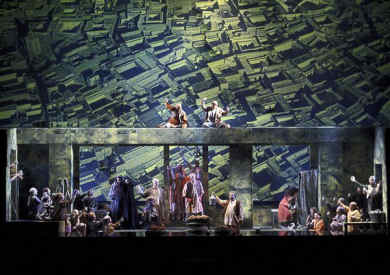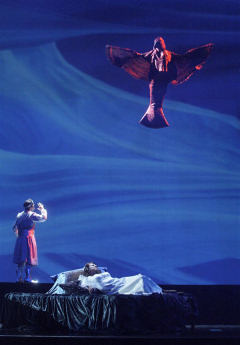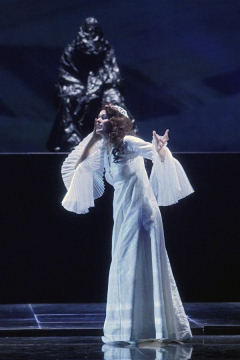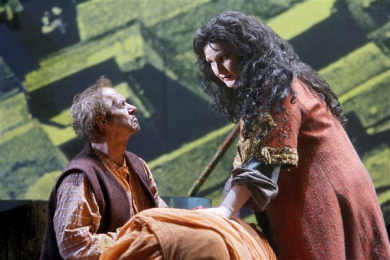|
Editor:
Marc Bridle
Webmaster: Len Mullenger
|
Seen and Heard International
Opera Review Finnish National Opera January Strauss Weeks (II): Die Frau ohne Schatten: (New Production Premier) Soloists, Chorus and Orchestra of Finnish National Opera Orchestra, Children's Choir, conductor: Muhai Tang, Helsinki 20.1.2006 (BK)
Although concert versions of Die Frau ohne Schatten have been given at FNO, this was the company's first staged performance. It formed the climax of FNO's short season of Strauss works and was awaited with excitement, since it had Michael Hampe to direct it and and sets by Hans Schavernoch - following up his resounding success with the Kupfer Parsifal in 2005.
That Die Frau is a difficult work is beyond much argument. It was premiered in 1919 when Germany had just emerged from the Great War and had evidently caused Strauss some heartache. 'No matter how I rack my brain - and I’m toiling really hard, sifting and sifting,' he wrote to von Hoffmansthal, 'my heart’s only half in it, and once the head has to do the major part of the work you get a breath of academic chill ... which no bellows can ever kindle into a real fire.' According to some sources, the premiere in Vienna also failed to provide the elaborate staging required by the libretto and even today the convoluted plot can seem awkward to follow despite Strauss's helpful leitmotiv structure.
Yet the music is magnificent, arguably the finest mix of intimate sound and orchestral climax that the composer wrote; and though vocally taxing for most of the principals, the score can still astonish. As Lotte Lehman (Barak's wife in the Vienna premiere) said of it, 'The music speaks a language all its own, simply overwhelming, and really requires no help from any medium other than itself ...'
The story itself has been interpreted endlessly from all kinds of perspectives including psychoanalysis. An Empress learns about the human condition firsthand after being commanded by her father (the god Keikobad) to obtain a 'shadow' and the ability to bear children within three days. To save her husband from being turned to stone, with the help of her Nurse the Empress descends from a spiritual realm to entice Barak the Dyer's wife to exchange fertility for riches.
Barak's wife is tempted: with no desire for children herself (despite her husband's wishes) she agrees to the bargain at first, rejects Barak as husband and tells him that she has been unfaithful even though she has not. Separated emotionally and physically, Barak and his wife are eventually reunited by the fact that they do indeed love one another. The Empress comes to value humanity's emotional riches so highly that she refuses her father's command; regardless of the consequences to herself and the Emperor. The father-god takes pity on the Empress's selflessness and sends her the shadow that she has earned through her faith in humanity. As the Emperor is released from his stony imprisonment, the Dyer and his wife - and the Empress and Emperor - achieve true immortality; the capacity for new life and continuing development.
Michael Hampe and Hans Schavernoch have wisely constructed a 'magical' production. The text requires a contrast between Keikobad's domain and Barak's workshop which is clearly located by the pictures used in the backdrops. No attempt is made to modernise the story and Carlo Tommasi's costumes portray clear differences between the mortals and the spirit characters, although some may find his penchant for shiny plastic .. well, over-enthusiastic. The decision to fly the Emperor's Falcon from the grid was probably an error too.
Things go wrong on first nights sometimes and a few went wrong with this one. Despite a fine design by FNO's lighting genius Kimmo Ruskela, the Empress managed to show a shadow while the text claimed she had none and some of the stage action seemed stilted on occasion. Some singers seemed unsure of their marks and the hapless falcon mentioned already looked painfully uncomfortable. The problems were minor in general however and should be easily corrected in subsequent performances.
But the music may not be. I saw the company's new and beautifully staged Der Rosenkavalier in January of last year, and felt that it had been seriously set back by Muhai Tang's conducting. At the time I wrote that there was... 'faulty ensemble a good deal of the time and that the orchestra was so relentlessly loud and rushed that the singers (including the powerful Soile Isokoski and Monica Groop) were barely audible in some passages. Worse than this though was the shock of hearing both the 'Presentation of the Rose' scene (spine tingling in almost any other performance) and the wonderful Hab' mir's gelobt trio in Act III sounding just dull. No magic, no beauty, and no sense whatever of Strauss's love affair with the female voice.'
Whether Muhai Tang is just not suited to Strauss or whether he has difficulty managing large orchestral sounds in opera houses is difficult to say, but to my ear most of that Rosenkavalier's problems were present once again in this production. A good deal of the louder passages were simply raucous, cluttered and more than slightly out of control. And while it was true that quieter passages were less problematic, the truly disconcerting thing was that some of the music sounded hardly like Strauss at all. Alarmingly, the orchestral climax at the the work's conclusion reminded me of nothing so much as Charles Ives. ' In thinking up music,' Ives said once, 'I usually have some kind of a brass band with wings on it in back of my mind.'
It gives me no pleasure at all to write this - for I regard FNO very highly indeed - but the contrast with the previous evening's Salome could not have been greater. There, conductor, orchestral players and singers were in accord, producing music together of which the composer would surely have been proud. Here though, with the exception of a very few felicitous moments it felt as though some kind of desperate competition was taking place between cast and conductor for far too much of the time. With the exceptions of Kirsi Tiihonen (Barak's wife) who sang particularly well with a ringing upper register, Barak himself (Hannu Niemelä) and the quite thrilling tenor of Petrus Schroderus as the Apparition of a Youth, everyone else seemed to be struggling. Since all of them are singers with fine international reputations, this was more than regrettable.
The bright spot if there is one, is that Der Rosenkavalier apparently improved for the later performances in its run. It is very much to be hoped that this Frau will do so too, for as it stands the production scores an easy 80% while the music merits a good deal less.
Bill
Kenny Pictures © Finnish National Opera 2006
Back to the Top Back to the Index Page |
| ||
|
||||






